|
|
|
Sort Order |
|
|
|
Items / Page
|
|
|
|
|
|
|
| Srl | Item |
| 1 |
ID:
109582
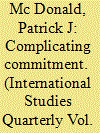

|
|
|
|
|
| Publication |
2011.
|
| Summary/Abstract |
This paper argues that the construction of sustainable peace settlements among great powers rests on a self-enforcing international bargain that impedes rapid shifts in the global distribution of military power and a series of stable fiscal bargains within great powers that both generate sufficient revenues to preserve a military deterrent and prevent programs of rapid armaments expansion. It examines how free resources- public property, natural resource wealth, international transfers, and sovereign lending-insulate governments from having to renegotiate the basic fiscal contract with society and can, as a consequence, create the domestic political capacity to sustain arms races and shift regional and global military balances to their advantage. These claims are examined by comparing the origins of World War I and the Cold War. The reexamination of World War I challenges the prevailing historical consensus by arguing that the primary cause of war lies within Russia rather than Germany. A discussion of early stages of the Cold War shows how the Truman and Eisenhower administrations both considered launching preventive war to solve the same fiscal dilemma faced by German leaders in July 1914.
|
|
|
|
|
|
|
|
|
|
|
|
|
|
|
|
| 2 |
ID:
138305
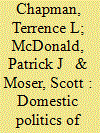

|
|
|
|
|
| Summary/Abstract |
We present a formal model of international bargaining between two states in which one government must negotiate with a domestic opposition faction to secure tax revenue for military spending. The model examines how robust the international order is to domestic political crises that activate a stark trade-off to a governing coalition. Namely, offering fiscal relief to stave off domestic revolution can simultaneously undermine the larger international political order by facilitating military spending that can, under some circumstances, result in sizable shifts in the relative distribution of military power between states. We find that two key domestic conditions influence the likelihood of preventive war: the distribution of income within the state's economy and the relative economic stake that opposition groups possess in international settlements.
|
|
|
|
|
|
|
|
|
|
|
|
|
|
|
|
| 3 |
ID:
134038
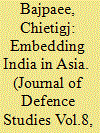

|
|
|
|
|
| Publication |
2014.
|
| Summary/Abstract |
The emergence of the Indo-Pacific as a new geopolitical frame ofreference is embedded in the growing strategic importance of themaritime domain and the rise of states that have demonstrated theability to 'transcend' their respective subregions. However, the Indo-Pacific remains a concept in its infancy, as evidenced by the fact that itcontinues to compete with alternative conceptions of regional space inAsia. This article argues that India has a vested interest in the survival ofthis new strategic geography as it serves to reinvigorate the momentumof its post-Cold War re-engagement with Asia under the aegis of its 'LookEast' and 'extended neighbourhood' policies. In this context, India shouldcontinue to cultivate the Indo-Pacific concept and ensure its embrace inthe region's evolving strategic vocabulary.
|
|
|
|
|
|
|
|
|
|
|
|
|
|
|
|
| 4 |
ID:
151534
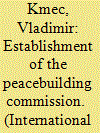

|
|
|
|
|
| Summary/Abstract |
This paper explores the changing distribution of international power by taking the example of the establishment of the United Nations Peacebuilding Commission (PBC). The paper points to tensions between the UN Security Council and the UN General Assembly over the responsibility for the PBC and in the composition of the Commission’s Organizational Committee. These tensions portray the reality of the current international system that is characterized by a shift in the geopolitical power distribution. It is a shift from a system in which the Security Council, strongly marked by the veto power of the permanent members, is responsible for the maintenance of international peace and security to a multilateral one that reflects an increased involvement of non-permanent members in the governance of international peace and security. The Commission marks a transformation of the UN from a system in which power of a state is understood in military terms to one that recognizes the growing importance of other aspects such as economic influence and geographical representation.
|
|
|
|
|
|
|
|
|
|
|
|
|
|
|
|
| 5 |
ID:
131484


|
|
|
|
|
| Publication |
2014.
|
| Summary/Abstract |
Large and rapid power shifts resulting from exogenous economic growth are considered sufficient to cause preventive wars. Yet most large and rapid shifts result from endogenous military investments. We show that when the investment decision is perfectly transparent, peace prevails. Large and rapid power shifts are deterred through the threat of a preventive war. When investments remain undetected, however, states may be tempted to introduce power shifts as a fait accompli. Knowing this, their adversaries may strike preventively even without conclusive evidence of militarization. In fact, the more effective preventive wars are, the more likely they will be launched against states that are not militarizing. Our argument emphasizes the role of imperfect information as a cause of war. It also explains why powerful states may attack weaker targets even with ambiguous evidence of their militarization. We illustrate our theory through an account of the 2003 US-led invasion of Iraq.
|
|
|
|
|
|
|
|
|
|
|
|
|
|
|
|
| 6 |
ID:
131998


|
|
|
|
|
| Publication |
2014.
|
| Summary/Abstract |
Rising powers have attracted tremendous interest in international politics and theory. Yet the ways in which secondary powers strategically respond to regional changes in the distribution of power have been largely neglected. This article seeks to fill this gap by presenting a systematic comparative analysis of the different types and causes of contestation strategies undertaken by secondary powers. Empirically, it focuses on two contentious regional dyads in East and South Asia, exploring how structural, behavioral, and historical factors shape the way in which Japan and Pakistan respond, respectively, to China's and India's regional power politics. The article concludes that the explanatory power of these factors depends on the respective secondary power's particular context: in the case of Japan, China's increasingly assertive regional behavior combined with a nontransparent military buildup has invoked the most significant strategic shifts, while in the case of Pakistani contestation, an increasing threat perception in the late 1980s led to the return to a pre-1971 revisionist agenda, whereas the overt nuclearization in the late 1990s mitigated India's growing conventional superiority and enabled Islamabad to replace soft balancing with more direct means of hard balancing.
|
|
|
|
|
|
|
|
|
|
|
|
|
|
|
|
| 7 |
ID:
101539
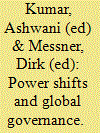

|
|
|
|
|
| Publication |
London, Anthem Press, 2010.
|
| Description |
xv, 359p.
|
| Standard Number |
9781843318316, hbk
|
|
|
|
|
|
|
|
|
|
|
|
Copies: C:1/I:0,R:0,Q:0
Circulation
| Accession# | Call# | Current Location | Status | Policy | Location |
| 055587 | 327.112/KUM 055587 | Main | On Shelf | General | |
|
|
|
|
| 8 |
ID:
141507
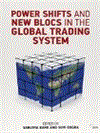

|
|
|
|
|
| Publication |
London, IISS, 2015.
|
| Description |
151p.pbk
|
| Series |
Adelphi Series; 450
|
| Standard Number |
9781138927247
|
|
|
|
|
|
|
|
|
|
|
|
Copies: C:1/I:0,R:0,Q:0
Circulation
| Accession# | Call# | Current Location | Status | Policy | Location |
| 058342 | 382/BAR 058342 | Main | On Shelf | General | |
|
|
|
|
| 9 |
ID:
158922


|
|
|
|
|
| Summary/Abstract |
India is frequently cast as a troublemaker and blamed for the breakdown of the Doha Round. This article provides a critical re-reading of India’s trade policy and its position in multilateral trade negotiations. It challenges the widespread characterisation of India as a recalcitrant spoiler, intent on derailing trade liberalisation at the WTO. It shows that with the emergence of its highly-competitive, export-oriented services sector, India became one of the leading advocates of global services trade liberalisation in the Doha Round. Yet, not unlike the traditional powers, India’s offensive trade interests are also combined with significant defensive concerns in agriculture.
|
|
|
|
|
|
|
|
|
|
|
|
|
|
|
|
|
|
|
|
|